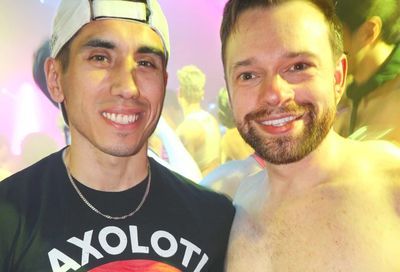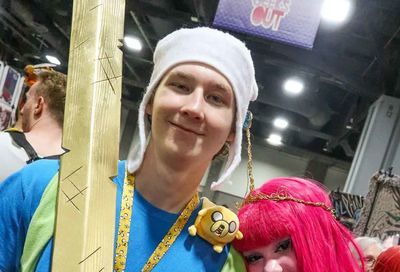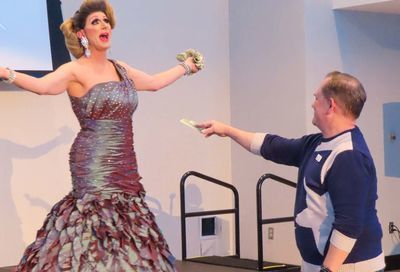State of Freedom
Blake Humphreys and Maryland's Free State Justice

You get the feeling that Blake Humphreys can’t help but look enthusiastic. There’s the sparkle in the eye, the impression of constant forward movement, the open faced smile — all things that come together to say, “I just know you’re going to see my point.”
A natural state of enthusiasm is a plus when working for gay and lesbian civil rights, and it certainly seems to have helped Humphreys in his work as the managing director of Free State Justice (FSJ). In 2001, FSJ played an instrumental role in the passage of Maryland’s landmark anti-discrimination act that prohibits discrimination against sexual orientation in housing, employment and public accommodation.
Immediately following that achievement, a group calling itself “Take Back Maryland” mounted a challenge to the law, attempting to force a statewide referendum to repeal it. Anticipating an extended campaign similar to those fought in Oregon, Colorado and Maine, FSJ and GLBT supporters across the state were relieved when the referendum movement failed to acquire enough legal signatures to place the referendum on the ballot.
Currently, Humphreys and Free State Justice are working with students and teachers to convince the State Board of Education to include sexual orientation as part of the safe schools regulations to combat harassment of GLBT students. And Free State Justice is now partnering with the Olney Theatre for a production of The Laramie Project, to promote the group’s work to pass hate crimes legislation in Maryland.
The 32-year-old Humphreys isn’t a native Marylander — he was raised on a farm in eastern Tennessee, “in the middle of nowhere.” Perhaps it’s that middle-American background that occasionally runs through his voice when he talks about the issues facing gays and lesbians in Maryland, an optimism that comes from discovering even the toughest challenges life throws at you can be overcome.
MW: You moved the D.C. and Maryland area in 1999. What were you doing before moving here?
|
HUMPHREYS: I lived in Atlanta for eight years after graduating from University of Tennessee. I went there for a sales internship with Marriot. I was with Marriot for a little over four years doing sales and event planning, then a small stint with the Ritz Carlton. I was a workaholic. I knew I wanted to do something to make a difference. Just accidentally I went to a gay pride festival in South Carolina and I heard David Mixner speak. I was in tears, it moved me so much. I read his book, and he and I started corresponding via email. Within three months I just quit my job. I decided to take some time off and find out what I want to do with my life. For two years I was renovating other people’s homes and doing lots of volunteer work. That volunteer work turned into a job with Georgia Equality Project which is a sister organization with Free State Justice. And so I worked for them for a year as their volunteer coordinator.
My partner got a job [in the D.C. area]. I was planning on getting back into sales or something. My boss sent my resume to Free State Justice and next thing I knew I had a job. It’s just been luck. I’ve been very fortunate to have a job that I enjoy and am very passionate about and I love doing. And I get to work with the most amazing people.
MW: Did you know you were gay growing up?
HUMPHREYS: I didn’t even know I was different. I thought everyone was like me, but being the good Southern Baptist you just don’t talk about those kind of feelings. I never heard the word gay or homosexual until I was in high school when kids started making fun of me — calling me names, teasing me, beating me up. I knew that was something I did not want to be, gay or queer. It took me a long time to get comfortable with myself and be very proud of who I am.
MW: How did your parents handle your problems in high school?
HUMPHREYS: I was very ashamed of what was going on and I tried to keep it from them. Throughout high school all I knew was that I did not want to be what those kids were calling me. It had to be something horrible because I was getting beat up for it.
MW: Were you effeminate?
HUMPHREYS: I have no idea. I know I made the mistake of carrying my books wrong the first day of high school.
|
MW: Obviously, things like that influence what you do in your life. When you think back to that time, is it something that you’ve let go of, or is it something you can still feel?
HUMPHREYS: I don’t think you would ever be able to let it go, so I definitely continue to feel it. It just took me a long time to get to the point of not caring what people thought and being extremely happy with who I am. That was when I was about 27.
MW: Are you close to your parents?
HUMPHREYS: My mom passed away when I was nineteen. I think she knew, but we never talked about it. My dad and I never had a close relationship — we loved each other, but we had the same relationship that he had with his father. When I came out to him it was very hard. There was a six month period where we did not speak. But I think [my coming out] brought us closer. I remember the turning point was when [my partner] Paul and I decided to move here. He’d known for almost four years that I was gay, and he asked if I was moving to be with Paul? For the first time my dad actually asked about someone in my life. And that was the turning point — now my dad is always asking about Paul. Of course, I wish our relationship could be closer, but I’m very happy with where we are right now.
MW: Do you feel like you get closer over time?
HUMPHREYS: I hope so. I know he’s concerned about my occupation. I send him news articles, and he’s sometimes concerned that someone might try to hurt me. When we were going through the referendum, my office received threats. I couldn’t tell my dad that, because I know that he would worry about it.
MW: Free State Justice has been in the news quite a bit with the attempted referendum and other issues. How do you describe the group’s mission?
HUMPHREYS: Free State Justice is the gay, lesbian, bisexual and transgendered civil rights organization for Maryland. Lobbying is the main thing that we do, but we also do education, outreach, activism and grass roots organizing. Our primary objectives have been getting GLBT civil rights legislation and policies passed in Maryland.
MW: You’re currently working to get safe schools regulations covering sexual orientation enacted for the state. What’s the status of that effort?
HUMPHREYS: This is the third try to get safe schools regulations. The Maryland State Board of Education tried in 1999, but instead of adding sexual orientation to the safe schools regulations, they took out all the categories and just said students should be free from harassment in schools. So they’ve introduced it again, and we’ve been working on it for six months — educating the school board members about what goes on in the schools for GLBT students. We’re trying to get all the categories added back to the safe schools regulations, and add sexual orientation to the multi-cultural diversity section. That’s how diversity training would come into play, so teachers would know how to deal with GLBT youth who are being harassed and picked on.
MW: Since the focus of FSJ is so often lobbying the state legislature, is there a difference in talking with school board members and state legislators?
HUMPHREYS: The school board is not accustomed to being lobbied and the legislators are. We’ve changed our strategy a little bit with the school board. We have a lot of students and teachers going before them during the public comment periods. The school board members usually will come up to the students afterwards and talk to them, thanking the young people for being so courageous by coming before them and telling their stories. They’ve been extremely welcoming.
MW: Have you been surprised by that?
HUMPHREYS: I guess I have, because in 1999 when they were trying to add sexual orientation, the school board had a hearing where the opposition held up child pornography and said, “This is what they’re going to be teaching in our schools.” The school board at that time decided it’s too controversial. This is a slightly different school board, and they have been very open-minded about this. We feel that we have the votes on the school board to get this passed. It was a little disappointing when they didn’t vote on it in June because [a legislative committee] asked them not to vote on it until they had time to review the proposed regulations and to make sure they don’t conflict with the anti-discrimination bill we just got passed. There are amendments to that bill that it cannot mandate school curriculum. I’m confident that when they review it that they are going to see that these safe schools regulations do not mandate school curriculum.
|
MW: Take Back Maryland launched a big campaign to have a referendum to repeal Maryland’s new anti-discrimination legislation, but weren’t successful. How did that come about?
HUMPHREYS: When the bill was signed into law, the opposition had sixty days to collect petitions from three percent of the [vote in the] last gubernatorial election, which was around fifty two thousand signatures. As soon as the bill was signed, they started collecting signatures. We started calling other states that had gone through this and figured out that we needed to start a campaign while they were collecting the signatures. We began planning to go through a referendum, and formed a coalition of GLBT, labor, religious and civil rights organizations. We were going to be facing an uphill battle — we had ten years to educate the state legislature on the need for this bill, but we had nine months to educate the people of Maryland on the need for keeping the bill.
We [also] had our legal aspect. We were very fortunate to have talented lawyers who did an incredible job of going through the [opposition’s] petitions and making sure everything was done correctly. We had lots of volunteers who reviewed the signatures and found that they were not done according to the law. We were disputing around fifteen thousand signatures, and they were only about twelve hundred signatures over what they needed. [In the end], the day before Thanksgiving they conceded that they did not have enough signatures and the law went into effect as of October first.
MW: Are there other political options open to Take Back Maryland to repeal the law?
HUMPHREYS: The only way they can repeal it is through the general assembly, so they would have to go and get enough votes there.
MW: So there’s no referendum process similar to Oregon’s or Maine’s.
HUMPHREYS: No, we will not be going through this every two years. That’s good to know.
MW: I assume you have more success with Democrats in terms of your lobbying efforts.
HUMPHREYS: It’s an overwhelmingly Democratic legislature, but we have had successes with Republicans. We don’t look at the party, we just look at the official, educating them about GLBT issues.
MW: Free State Justice doesn’t endorse political candidates. Do you have any politicians asking you for endorsements?
HUMPHREYS: Actually, no. Most of the time politicians want to sit down with us and find out what our issues are so they can target their campaign for the GLBT vote.
MW: The gay population in D.C. is fairly concentrated, but as we’ve spread out we hear more about suburban gays. Are you seeing growth in gay neighborhoods in Maryland?
HUMPHREYS: Definitely. Even in Western Maryland there’s something very similar. There are pockets of the gay community basically all over the state.
MW: What’s the biggest change you would see for gays and lesbians in Maryland in the next five to ten years?
HUMPHREYS: I see this as a critical time for the GLBT movement, especially with the upcoming elections — a lot of GLBT supporters that may have a hard time in the upcoming elections. We need to make sure that our supporters are elected because that’s going to be the turning point for us in trying to get hate crimes legislation passed, trying to repeal the sodomy law, achieve domestic partner benefits and gay marriage. This November is going to be pivotal for our civil rights movement.
For more information about Free State Justice visit www.freestatejustice.org. The Laramie Project runs through August 11 at the Olney Theatre Center, 2001 Olney-Sandy Spring Road, Olney, Md. Tickets are $15 to $35. For more information call (301) 924-3400, or visit www.olneytheatre.org.
Support Metro Weekly’s Journalism
These are challenging times for news organizations. And yet it’s crucial we stay active and provide vital resources and information to both our local readers and the world. So won’t you please take a moment and consider supporting Metro Weekly with a membership? For as little as $5 a month, you can help ensure Metro Weekly magazine and MetroWeekly.com remain free, viable resources as we provide the best, most diverse, culturally-resonant LGBTQ coverage in both the D.C. region and around the world. Memberships come with exclusive perks and discounts, your own personal digital delivery of each week’s magazine (and an archive), access to our Member's Lounge when it launches this fall, and exclusive members-only items like Metro Weekly Membership Mugs and Tote Bags! Check out all our membership levels here and please join us today!



















